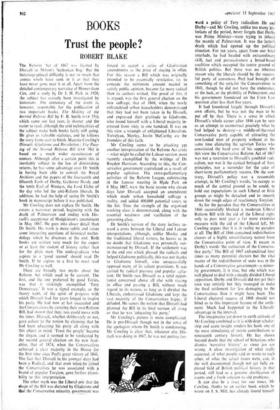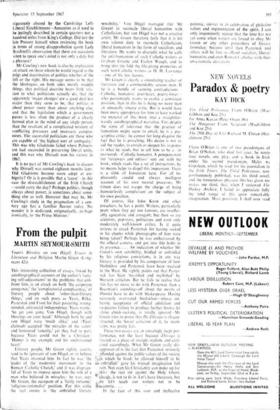Trust the people? BOOKS
ROBERT BLAKE
The Reform Act of 1867 was likened by Disraeli to Milton's `Serbonian Bog.' But the historiographical difficulty is not so much that armies whole have sunk in it as that they have never gone near it at all. Apart from the detailed contemporary narrative of liomersham Cox, and a study by Dr J. H. Park in 1920, the subject has scarcely been investigated by historians. The centenary of the event is, however, responsible for the publication of two important books. The Making of the Second Reform Bill by F. B. Smith (CUP 55s), which came out last year, is shorter and the easier to read, although the arid technicalities of the subject make both books fairly stiff going. He gives us valuable statistics, and he follows the story from start to finish. Maurice Cowling's Disraeli, Gladstone and Revolution : The Pass- ing of the Second Reform Bill (CUP 70s) is based on a much wider examination of sources.. Although after a certain point this is inevitably subject to the law of diminishing returns, he has some advantage over Dr Smith in having been able to consult the Royal Archives and the papers of the fourteenth and fifteenth Earls of Derby, Gathorne Hardy and the tenth Earl of Wemyss, the Lord Elcho of the day who led the anti-Reform liberals. In addition, he had the help of seeing Dr Smith's book in manuscript before it was published.
Mr Cowling does not replace Dr Smith. He covers a narrower period, beginning with the death of Palmerston and ending with Dis- raeli's acceptance of Hodgkinson's amendment in May 1867. He goes into closer letail than Dr Smith. His work is more subtle and raises some interesting questions of historical metho- dology which he discusses at the end. Both books are written very much for the expert or at least the student of history rather than for the plain man. The undergraduate who aspires to a 'good second' should read Dr Smith. If he aspires to a first he must read Mr Cowling as well.
There arc broadly two myths about the Reform Act which used to be current. The first, and the one preferred by good Tories, was that it strikingly exemplified 'Tory Democracy.' It was a signal example, so the theory went, of the spirit of progress with which Disraeli had for years longed to inspire his party. He had now at last succeeded and the Conservatives, by carrying their own Reform Bill, had show n that they, too, could move with the times. Disraeli, whether deliberately or not, gave colour to the notion by claiming that he had been educating his party all along with this object in mind. 'Trust the people' became the slogan, and it seemed to be vindicated by the second general election on the new fran- chise, that of 1874, when the Conservatives achieved a clear majority in the House for the first time since Peel's great victory, of 1841. The fact that Disraeli in his younger days had been a Radical, and that even wherthe joined the Conservatives he was associated with a brand of popular Toryism, gave further plausi- bility to this interpretation.
The other myth was the Liberal one that the shape of the Bill was dictated by Gladstone and that the Conservative minority government was
forced to accept a series of Gladstonian amendments as the price of staying in office. For this reason a Bill which was originally intended to be essentially restrictive, i.e. to concede the minimum amount needed to satisfy public opinion, became far more radical than its authors wished. The proof of this, it is argued, was the first general election on the new suffrage, that of 1868, when the newly enfranchised urban householders demonstrated that they had not been taken in by Disraeli, and expressed their gratitude to Gladstone, who found himself with a Liberal majority in- creased from sixty to one hundred. It was on this view a triumph of enlightened Liberalism. Trevelyan, Morley, Justin McCarthy are the founders of this faith.
Mr Cowling seems to be attacking yet another interpretation of the Reform Act crisis —what might be called the Labour version, most recently exemplified by the writings of Dr Royden Harrison. According to this, the Con- servative government capitulated as a result of popular agitation. The extra-parliamentary activities of the Reform League, culminating in the famous meeting in Hyde- Park on 6 May 1867, were the basic reason why eleven days later Disraeli accepted an amendment which made urban household suffrage a reality, and added 400,000 potential voters to the list. Thus the strength of the organised working class is demonstrated, along with the essential weakness and vacillation of the governing class.
Dr Smith's version of the story inclines to- ward a cross between the Liberal and Labour interpretations, although, unlike Morley and the traditional liberal writers, he leaves us in no doubt that Gladstone was personally out- manoeuvred by Disraeli. If the settlement was in the end one which pleased the radicals and helped Gladstone politically, this was not thanks to Gladstone himself, who unsuccessfully opposed many of its salient provisions. It was carried by radical pressure and popular agita- tion. Dr Smith sees Disraeli as a total oppor- tunist concerned above all else with staying in office and passing a Bill, without much regard to its nature, as long as it divided the Liberals, embarrassed Gladstone and kept the vast majority of the Conservatives happ!., if deluded. He scouts the notion that Disraeli had planned the Bill in its final version all along or that he was 'educating his party.'
Mr Cowling's picture is more complicated. He is pro-Disraeli though not in the sense of the apologists whom Dr Smith is condemning. Mr Cowling is clear that, whatever else Dis- raeli was doing in 1867, he was not putting for- ward a policy of Tory radicalism. He and Derby—and Mr Cowling, unlike too many his- torians of the period, never forgets that Derby was Prime Minister—were trying to Inherit the mantle of Palmerston. It was the latter's death which had opened up the political situation. For ten years, apart from one: brief interlude, he had headed with extraordinary skill, tact and persuasiveness a broad-based coalition which occupied the centre ground of British politics. But there was no inherent reason why the liberals should be the success- ful party of consensus. Peel had brought off something of the sort.for the Conservatives in 1841, though he did not have the endurance, or the luck, or the pliability of Palmerston, and his government foundered on the Corn Law question after less than five years.
It had foundered largely through Disraeli's own efforts, but he was not the man to be put off by that. There is a sense in which Disraeli's whole career after 1846 can be seen as an attempt to reconstruct precisely what he had helped to destroy—a middle-of-the-road Conservative party capable of attracting the non-landed men of property without at the same time alienating the agrarian Tories who constituted the hard core of his support. On this view the Conservative Reform Act of 1867 was not a reversion to Disraeli's youthful radi- calism, nor was it the cynical betrayal of Tory principles, nor a surrender for the sake of short-term parliamentary success. On the con- trary, Disraeli's policy was a reasonable attempt, in Mr Cowling's words, `to.occupy as much of the central ground as he could, to hold out expectations to such Liberal or Irish groups as might be detached and to smooth down the rough edges of reactionary Toryism.' As for the paradox that the Conservatives in 1866 successfully blocked a moderate Liberal Reform Bill with the aid of the Liberal right, only to pass next year a far more extensive measure with the aid of the Liberal left, Mr Cowling argues that it is in reality no paradox at all. The Bill of 1866 contained redistribution clauses of a highly unsatisfactory nature from the Conservative point of view. It meant in Derby's words 'the extinction of the Conserva- tive party.' The Bill of 1867 enfranchised four times as many potential electors but the vital matter of the redistribution of seats was in the hands of a Conservative government—a minor- ity government, it is true, but one which was well placed to deal with a deeply divided Liberal opposition. Derby and Disraeli did not get their own way entirely but they managed to make the final settlement far less damaging to the Conservatives than it might have been. The Liberal electoral success of 1868 should not blind us to this important feature of the settle- ment. Much had happened to the Liberals' advantage in the interval.
The imaginative yet down to earth attitude of Mr Cowling combined as it is with deep scholar- ship and acute insight renders his book one of the most stimulating of recent contributions to nineteenth century history. He has shown beyond doubt that the school of historians who dismiss 'narrative history' as vieux 'jeu are wrong. A close investigation of what really occurred, of what people said or wrote to each other, of what the actual issues were, can, in the well documented though not yet fully ex- plored field of British political history in that period, still lead to a genuine clarification of events and a fresh solution to old problems. .It can also be a tract for our times. Mr Cowling, thanks to an earlier book which he wrote on J. S. Mill, has already found himself vigorously abused by the Cambridge Left- Liberal Establishment—Annanism as it used to be jestingly described in certain quarters not a hundred miles from King's College. Did not the late Provost himself when reviewing the book in terms of strong disapprobation quote Lady Bracknell's observation that there are occasions when to speak one's mind is not only a duty but a pleasure?
Mr Cowling's new book is also by implication an attack on those whom he would regard as the prigs and doctrinaires of politics whether of the left or the right: His message seems to be that the ideologues on both sides merely muddle things, that political doctrine bears little rela- tion to what politicians actually do, that the apparently 'major changes' are a good deal less major than they seem to be, that politics is about power more than about any thing else, and that the legislation which a government pasSes is less often the product of a clearly formed plan in the mind of any single person. than the resultant of a complicated mixture of conflicting pressures and necessary compro- mises. The successful politicians are those who are capable of 'the highest sort of ambiguity.' This was why Gladstone failed where Palmers- ton had succeeded in preserving liberal unity, and this was why Disraeli won his victory in 1867.
It is no part of Mr Cowling's book to discuss why Disraeli was ousted eighteen months later. Did Gladstone become more adept at am- biguity? Or is it possible that a 'cause'--in this case the disestablishment of the Irish Church —could carry the day? Perhaps politics, though always about power, is sometimes about some- 4ting else as well. However that may be, Mr Cowling's study in the pragmatism of a cen- tury ago has a familiar flavour today. No wonder it is dedicated, enigmatically, perhaps ironically, to 'the Prime Minister.'































 Previous page
Previous page